- When Zionists negotiated & implemented Haavara with Hitler for 7 years starting from 1933, were they motivated by the urgency to "save" German Jews?
- How did German
Jews perceive the Zionist movement?
Did they consider Zionists allies? or the enemy from within? - How did Zionist leaders respond to MS St. Louis' (Voyage of the Damned) tragedy?
- How was this financial instrument (Haavara) structured? In detail, how was it designed & operated?
- How did Zionist leaders respond to the worldwide boycott against the Nazi economy when Hitler rose to power in early 1933?
- How German Jews' assets were divvied between Nazis & Zionists? How much cash was left?
- What was the financial situation of the Jewish Agency just before Haavara was signed?
- Did Zionists market Nazi
goods outside of Palestine?
Did they attempt to locate other safe havens? - Why Zionist leaders were frantic to stabilize the German currency and economy in early 1933?
- What was the size of this financial
instrument?
How critical Haavara was for the creation of the "Jewish state" to be?
By Saul Jay Singer
Oct. 20th, 2021
The boycott movement perhaps reached its zenith on March 27, 1933, when the American Jewish Congress held a massive and wildly successful rally at Madison Square Garden in New York. Simultaneous rallies were held in 70 other municipal areas across the United States and Europe, and radio broadcasts reached hundreds of cities throughout the world. Above and beyond the great effectiveness of the boycott in bringing pressure to bear on the German economy, it also represented a significant symbolic boost to the Jewish psyche, as the Jewish people --faced with arguably the greatest threat to their existence in history -- refused to accept their fate, actively resisted the Nazis, and manifested pride and dignity in the process.
Even if, as some analysts contend, the boycott had a minimal aggregate effect on the German economy, it had an enormous impact on the Nazis. Having reached the pinnacles of power principally through promising the German people a rebuilt and thriving economy, the Nazis perceived the boycott as an enormous threat to the German economy, which was highly dependent on income generated by exports as corporations, business leaders, and the public breached German contracts, canceled German orders and refused to deal with German companies.
The effect of the boycott was particularly profound in the United States, where German imports were reduced by nearly 25 percent, and in Eretz Yisrael, where most doctors refused to prescribe German medicines, resulting in great losses to German pharmaceutical companies. Hit particularly hard by the boycott was the Hamburg-America Line, whose board was forced to resign by the Nazi regime. The Nazi response to the threat was to try to divide a very organized anti-Nazi worldwide Jewish network, which was the predicate for the Haavara Agreement.
On August 7, 1933, an official delegation of Zionists from Germany and Eretz Yisrael led by Eliezer Hoofien (1881-1957), director of the Anglo-Palestine Bank (which later became Bank Leumi) who later created Israel’s monetary system, met with representatives of the Third Reich in Berlin to negotiate an easing of the boycott of Nazi goods. With the meeting evidencing no progress and the discussions about to end with no deal, Hans Hartenstein, director of the Reich Office of Currency Control, received a telegram from the German consul in Tel Aviv ordering him to get a deal done because an agreement with the Jewish representatives was necessary to break the boycott that was crippling the Third Reich in its infancy.
The result was the controversial Haavara (“Transfer”) Agreement that allowed Jews seeking to flee Germany to sell their assets in Germany in exchange for receiving permission to keep a portion of the sale proceeds and transfer some portion of their assets to Eretz Yisrael -- then under the control of the British Mandate.
There was no formal contract evidencing the Agreement but, rather, the Reich Economics Ministry issued a decree a few days later authorizing the Zionists to create two transfer clearinghouses, the first under the supervision of the German Zionist Federation in Berlin, and the second under the supervision of Anglo-Palestine’s trust company in Tel Aviv. The Tel Aviv office, known as the Haavara Trust and Transfer Office Ltd.” (or “Haavara Ltd.” for short), was operated by business managers, and all its stock was owned by the Anglo-Palestine Bank under the direction of the Jewish Agency.
An important role in the Haavara Agreement was played by Hanotea (“the Planter”), a citrus planting company based in Netanya established in 1929 by Jewish settlers on moshavot in Eretz Yisrael. According to a deal negotiated with Hitler’s Economic Ministry: (1) the Nazi government unblocked the German bank accounts of the Jews participating in the Agreement; (2) the funds in these accounts were transferred to Hanotea, which used the funds to purchase German goods and agricultural products (at exorbitant prices); and (3) these products were shipped to the original Jewish account holders in Eretz Yisrael, who sold them to import merchants there.
One potential problem with implementing the Haavara Agreement was the infamous British blockade prohibiting Jews from entering Eretz Yisrael and the broad limitations imposed by the British on Jewish immigration. However, Jews participating in Haavara were able to bypass these harsh immigration proscriptions under the British “immigrant investor program,” pursuant to which a Jew could enter Eretz Yisrael if he presented a so-called “Capitalist Certificate” issued by the British proving his possession of the equivalent of 500 Palestinian pounds (later doubled to 1,000 pounds).
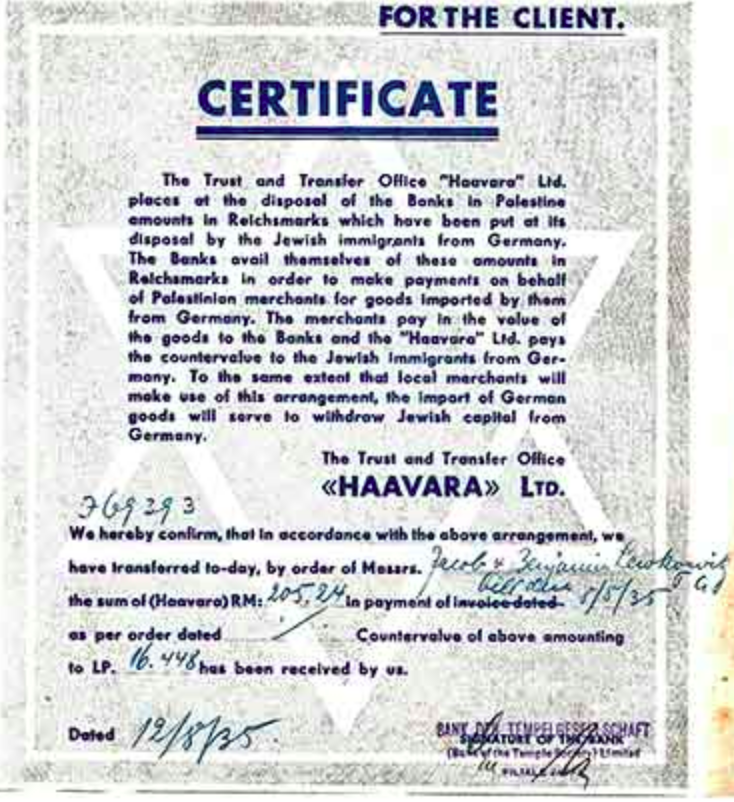 Haavara Certificate: Exhibited here is a very rare Haavara Certificate, dated August 12, 1935, regarding the transfer of 205.24 RM by Jacob and Benjamin Lewkowitz:.
Haavara Certificate: Exhibited here is a very rare Haavara Certificate, dated August 12, 1935, regarding the transfer of 205.24 RM by Jacob and Benjamin Lewkowitz:.It is indisputable that there never would have been a Haavara Agreement without the boycott. From the Nazi perspective, the principal purpose of the Agreement was to end the boycott and to bolster a weak German economy by reaping a financial windfall through a payoff from Zionist leaders. It also created an important market for German exports in Eretz Yisrael, with 157 million Reichmarks (about $35 million) exported to Jewish businesses there under the program.
However, there was a second -- and perhaps counterintuitive -- motive for the Nazis to embrace the Agreement. Early in the Reich, Hitler viewed Eretz Yisrael as a land of promise as a useful dumping ground for ridding Germany of thousands of Jewish “misfits.” As such, the Nazis saw the Agreement as a means to rid themselves of tens of thousands of “undesirables” through “voluntary emigration” before later realizing that killing millions of Jews was a relatively simple proposition of administering an inexpensive dose of Zyklon-B gas to thousands at a time.
Even today, there are deeply misguided commentators who cite the Haavara Agreement as evidence that Hitler actually supported Zionism. These include London Mayor Ken Livingstone and Mahmoud Abbas, who writes in The Secret Relationship Between Nazism and Zionism that the Zionists collaborated with the Nazis to kill European Jews to encourage the remainder to emigrate to “Palestine.”
In fact, the Agreement was merely a passing concession by Hitler to improve the failing German economy and, while he did temporarily favor getting Jews out of Germany as a means to purify his Reich before he turned to exterminating them, there is nothing to suggest that he ever specifically directed them to Eretz Yisrael. Similarly, when Eichmann declared “I am a Zionist,” he was not embracing Jewish aliyah and self-determination but, rather, meant only that Zionism provided an efficient resolution to Germany’s “Jewish problem.”
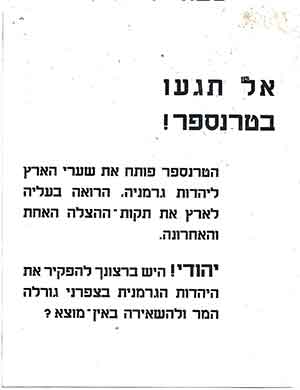
Exhibited here is a dramatic printed proclamation in support of the Haavara Agreement: Pro-Haavara Proclamation, DO NOT TOUCH THE TRANSFER! The Transfer opens the gates of the land [of Israel] to the Jews of Germany, who see aliyah to the land as the only and final hope for rescue. Jew! Do you wish to abandon German Jewry and leave it to its bitter fate and with no chance for escape?.
However, Haavara brought Holocaust deniers out of their fetid ratholes, who used the Agreement to “prove” that the Zionists, like all Jews, were only interested in money and that Jews were sent to “displace” the “native Palestinian inhabitants” for financial gain. The Nazis argued that if the Jews were trading with them, there could be no basis for anyone else to boycott German goods, which devastated the boycott by effectively nullifying any moral basis for taking economic action against the Third Reich. Critics of the Agreement claimed that cynical Zionists elevated aliyah to the status of a supreme value that transcended any concern for the fate of non-Zionist Jews or others who shunned aliyah.
Haavara brought to the fore complex moral and ethical questions about Jewish rights in general, Zionist needs in particular, and the interests of the broader community vs. the rescue of individuals. At a time when unity was particularly essential, it created substantial internecine struggle and fragmentation, as the struggle between the Haavara and boycott movements manifested itself across several key demographics and factions.
On the other hand, Haavara supporters claimed that the boycott constituted a threat to German Jews because a mass Jewish-led worldwide boycott would incentivize the Nazis to increase their Jewish persecution even further; it would encourage a counter-boycott against Jews and increase economic anti-Semitism across Europe; and it would grant the Nazis a huge propaganda victory by providing “confirmation” of their worldwide Jewish conspiracy theories.
First and foremost, Haavara and boycott reflected fundamentally opposing approaches to the best way to help German Jews at the outset of the Holocaust. In essence, boycott supporters argued that the pressure being brought to bear on Hitler was effective and was yielding real and tangible results. On the other hand, Haavara supporters claimed that the boycott constituted a threat to German Jews because a mass Jewish-led worldwide boycott would incentivize the Nazis to increase their Jewish persecution even further; it would encourage a counter-boycott against Jews and increase economic anti-Semitism across Europe; and it would grant the Nazis a huge propaganda victory by providing “confirmation” of their worldwide Jewish conspiracy theories.
Second, the boycott vs. transfer issue became a focal point of disputes between the Yishuv and the Diaspora. The Mapai party, which all but ruled the Yishuv, viewed Haavara as crucial to its plans for a Jewish state, while Diasporan Jewish communities generally supported the boycott as the most effective tool against Nazi Germany.
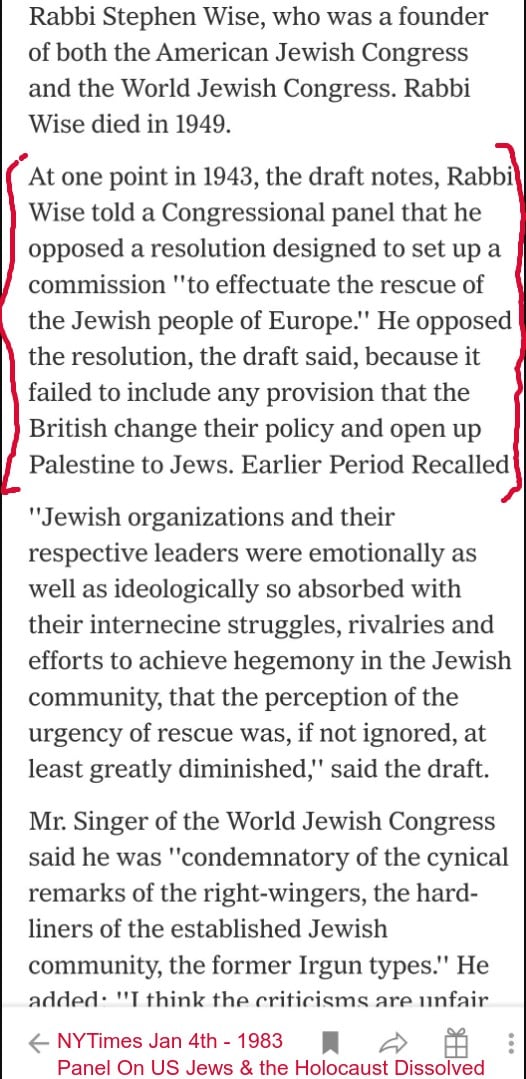 NYTimes,
as late as 1943 Zionist leaders were lobbying US congress to block
Jewish refugees' safe havens unless GB opens immigration into
Palestine
NYTimes,
as late as 1943 Zionist leaders were lobbying US congress to block
Jewish refugees' safe havens unless GB opens immigration into
PalestineOn the other hand, the Agreement was bitterly criticized by many non-Orthodox Jewish leaders, both within the Zionist movement and outside it, who were furious that easing the boycott pressure on Germany would stabilize its economy and remove the Jews’ most effective weapon against Hitler. Leading Haavara opponents in the United States included Abba Hillel Silver and the World Zionist Congress, and Stephen Wise, president of the American Jewish Congress. Notwithstanding fervent appeals by Wise and others to the Nineteenth Zionist Congress (Lucerne, 1935) to vote against the Haavara Agreement, the Congress ultimately endorsed it.
Charedi leaders were strong supporters of the Nazi boycott, to the point that at its January 1934 fifth national convention in Poland, Agudat Israel issued a formal declaration that any betrayal of the boycott is a traitorous act of treachery against the Jewish people. Moreover, charedi rabbis, who opposed the “Tzionists” and viewed the very idea of a Jewish state as an anathema, were not going to support a Haavara movement that would assist the Yishuv in establishing Jewish sovereignty in Eretz Yisrael, which they believed to be contrary to the Torah.
Fourth, while the Transfer Agreement did save the lives of many Jews, they were all wealthy Jews with access to assets sufficient to qualify for the immigration certificates necessary to permit passage through the British blockade and entry into Eretz Yisrael. Boycott supporters contended that the Agreement did literally nothing for the overwhelming mass of German Jewry who lacked sufficient financial resources and that, in fact, it significantly damaged them by weakening the boycott.
Fifth, the anti-Haavara camp argued that cooperating with the Nazi regime in evacuating Germany’s Jews evidences Jewish acceptance of their banishment from their country and homes and serves as a model for the rest of Europe, particularly Poland, for ridding themselves of Jews with impunity. Haavara proponents, however, maintained that very purpose the Zionist idea -- the collapse of the Diaspora and the ingathering of Jewish exiles in Eretz Yisrael -- was facilitated by the Agreement
Sixth, the clash between the respective supporters of Haavara and boycott also exacerbated tensions between the Labor Zionists movement and the Revisionists, which were already raging within the Zionist movement.
The most fervent and outspoken opponents of the Agreement were Ze'ev Jabotinsky and the Revisionist Zionists, and the depth of their bitterness was such that it prompted rebellion, even murder, within the Yishuv and the Diaspora. Most significantly, the Revisionist Zionists were blamed for the assassination of Chaim Arlosoroff, essentially the Jewish Agency’s foreign minister, who had played a leading role in negotiating the Transfer Agreement.
 Fake Valor: Jewish-Brigade, Italy April - 1945: The
Impostering Hero, see me while I bomb Nazis ONLY a few weeks before WWII ended. We wonder: any similar
selfies were taken at al-Alamein meat grinder!
Fake Valor: Jewish-Brigade, Italy April - 1945: The
Impostering Hero, see me while I bomb Nazis ONLY a few weeks before WWII ended. We wonder: any similar
selfies were taken at al-Alamein meat grinder! Almost nine decades after the deal was negotiated, the questions remain:
Click here for the original version a the Jewish Press
Haavara FAQs Continued
- Is there a timeline chart for Haavara? Was it interrupted after Nuremberg Laws & Kristallnacht?
- Haavara had a limited impact on German exports, therefore, what is the big deal?
- How did Zionist leaders respond to Hitler's rise?
- How did Zionist leaders respond to the Jewish anti-Nazi boycott?
- How many German Jews were actually "saved" when Haavara was honored by both Nazis & Zionists?
- When Eichmann visited Palestine in 1937, did he come to meet with Mufti Haj Amin, or with Zionists' Haganah?
- When Haavara was stopped? Why and by whom?
- How did Hitler favorite Zionists over other Jewish political groups (domestic or foreign)? Why?
- How did Zionists respond
to Nuremberg Race Laws?
How comparable Nazis' & Zionists' views were on mix-marriage, Aryan (Jewish) labor & land, pretending to be Aryan (Jewish) & segregated living? - How did Zionist leaders react when other Jewish organizations attempted to replicate Haavara by resettling Jews to safe havens other than Palestine?
- How did Zionist leaders respond
to Evian Conference?
How did Zionist leaders respond to Dominican Republic's offer to save 100k Jews? - How did Zionist leaders respond to the Kristallnacht pogrom?
- How did Zionist leaders respond when England saved 10k German Jewish children after Kristallnacht?
- How did Zionists respond to Alaska Jewish refugees' resettlement scheme?
- How did Zionists and Jewish leaders respond to Schacht-Rublee Plan?
- How did Zionists respond
when the Holocaust became known to them?
What was their response to Bermuda Conference in April 1944? - Why did Hitler work nonstop with Zionists if they were a small fringe group with limited resources?
- Why Zionists were fixated on Palestine as the ONLY destination for Jewish refugees?
- How could Zionists execute pro-Hitler policies when it was them who sent tens of thousands to fight Nazis in Europe?
- How did Zionists respond to the Warsaw Ghetto uprising?
- Why news of the Holocaust was played down in the Zionist press?
- Did Zionists foresee the Holocaust before WWII, they've felt helpless & since it was fait accompli they decided to make the best out of it.
- What were the ramifications of Zionist fixation on Palestine as the ONLY destination?
- Hitler used German Jews as hostages, Zionists can't be blamed for negotiating with hostage takers?
-
Did Zionist leaders position
themselves to profit from antisemitism?
If that was the case, did Zionists foment antisemitism? - Why did Zionist leaders work hard to starve funds that were allotted to Jewish refugees' resettlement?
- Why did all major Jewish organizations fail to investigate their actions & passivity between 1933-45?
- If all kinds of people (including Mufti Haj Amin) dealt with Hitler, why are Zionists being demonized?
- How did Ze'ev Jabotinsky's Revisionists party react to Haavara?
- What is Catastrophic Zionism?
- How did the British Mandate regulate immigration to Palestine before WWII?
- Are you implying that Jews caused the Holocaust?

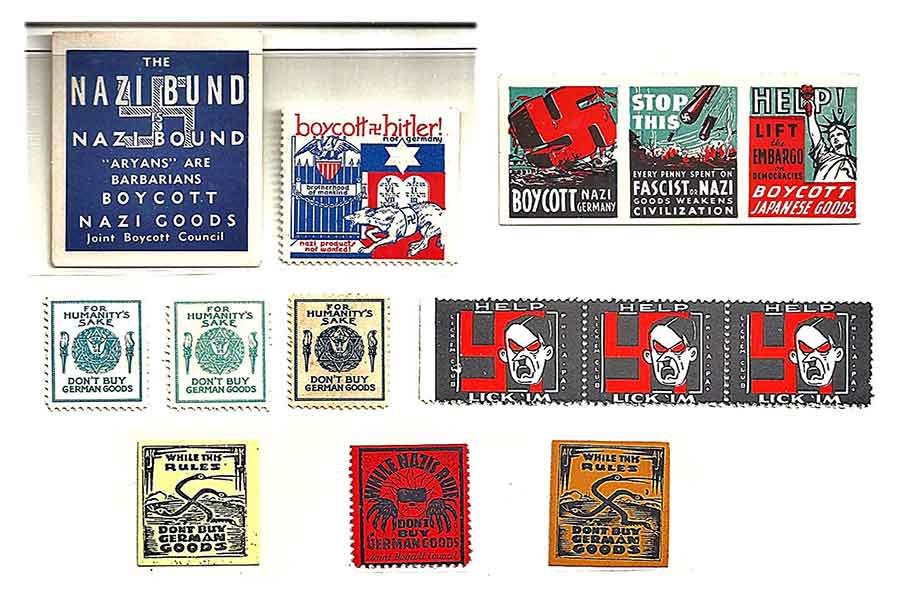
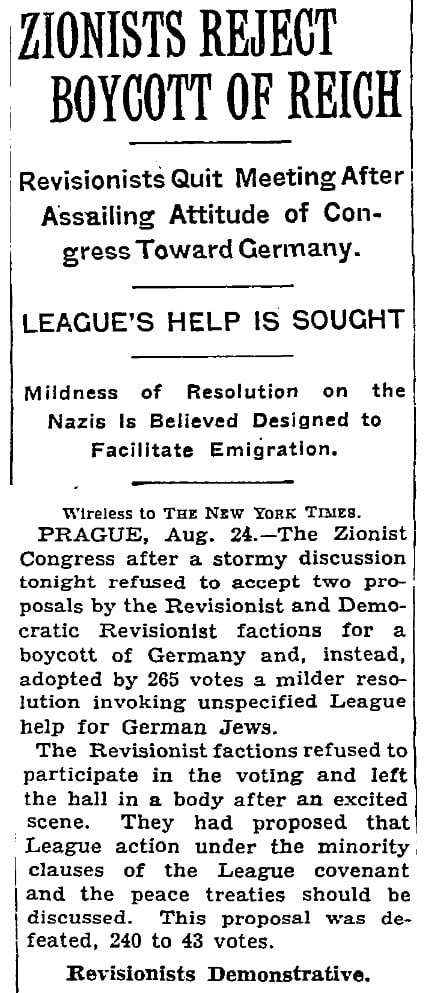
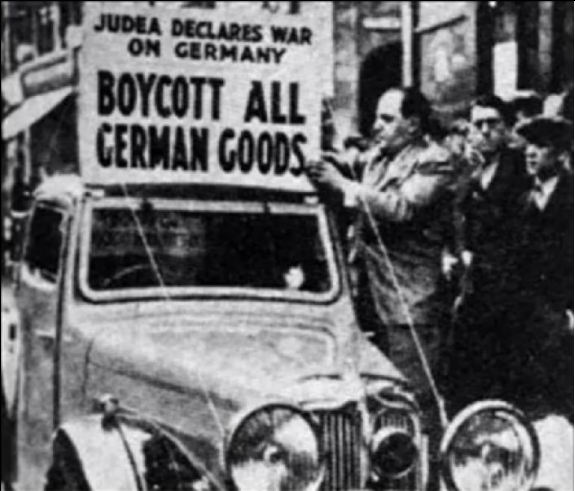


Post Your Comment
*It should be NOTED that your email address won't be shared, and all communications between members will be routed via the website's mail server.